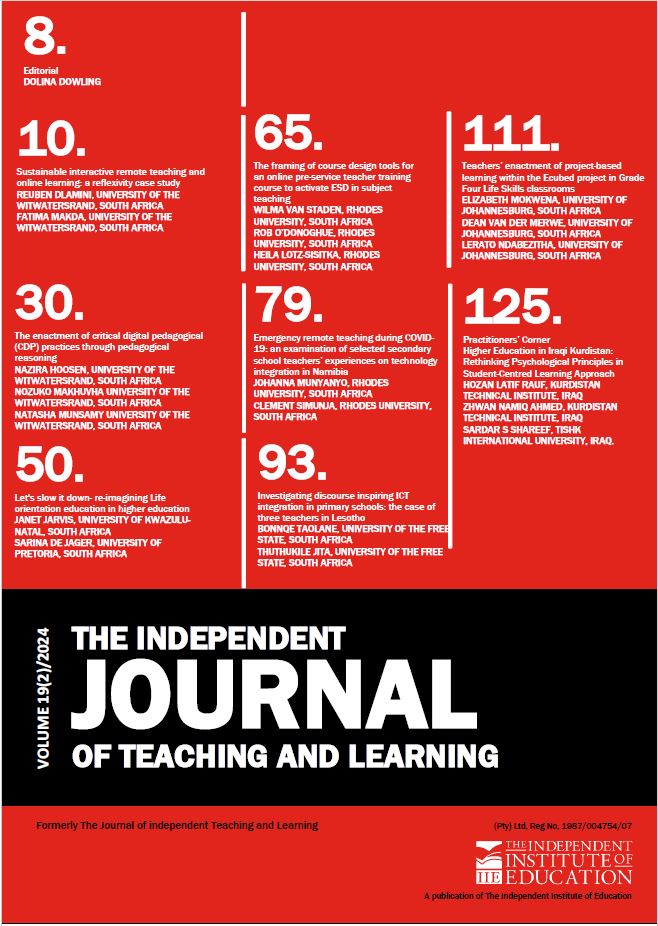About the Journal
The Independent Journal of Teaching and Learning (The IJTL) is an education-focused journal published by The Independent Institute of Education, published twice a year (bi-annually). The aim of the journal is to make a difference to educators at the primary, secondary and tertiary levels in South Africa. It serves as a scholarly forum for academics and education practitioners to share research on teaching and learning.
Read more
Current Issue

The use of technology in education is not new. However, the plethora of advanced technologies pervading every aspect of the education journey is. The COVID-19 pandemic necessitated the abrupt closure of education organisations for face-to-face teaching and the shift to online learning. While many higher and further education institutions had already implemented online learning in programmes or some elements thereof, the pandemic accelerated this transition. In addition, the democratisation of education through MOOCs (Massive Open Online Courses) was well established, particularly in the Global North. Technological advances have increased accessibility to education. However, little had been done in the basic education sector in South Africa and the Global South more generally. (As noted in previous editorials, the digital divide is leaving more and more children behind with little prospect of catching up with their peers in well-resourced regions.)
The shift to online learning and teaching not only shows no signs of diminishing but is exponentially increasing. This can be attributed to advanced technologies (EdTech 4.0) such as Artificial Intelligence (AI), machine learning, robotics, and the Internet of Things (IoT). The use of AI in many higher education institutions helps to inform inter alia recruitment, student programme selection, pedagogy and assessment. AI allows for personalised learning paths through data analytics which track student learning styles, performance, identify learning gaps, and tailor courses to meet individual needs. Virtual Reality (VR) and Augmented Reality (AR) provide immersive engaging learning experiences. Taken together these enhance the efficiency and effectiveness of the student learning journey. The Fourth Industrial Revolution (4IR) continues at pace!
As a consequence, societal and economic needs are changing which has inter alia implications for educators and programme delivery. Educators need to be come agile facilitators and mentors. Pedagogical innovations are required to meet the skills required in this rapidly changing environment. Hence, educators need to keep abreast with the AI and other technologies to deliver high quality, meaningful and engaging learning programmes.
Concomitantly, people need to be lifelong learners to be competitive in the evolving labour market. Technologies are being used in industries ranging from call centres to law. Chatbots, for instance, are increasingly sophisticated and can deal with routine customer problems. While less opportunities may be available due to automation, higher level skills are needed such as critical thinking, creativity, problem solving, and emotional intelligence. As stated by the OECD ‘Effective higher education is crucial to support citizens and countries with advanced knowledge and skills needed to flourish in an era of fast-paced technological change’ (oecd.org/higher-education).
It is a sine non qua that for learners to have a successful learning journey, a number of critical features need to be present. The use of technological tools does not obviate requirements such as clear measurable learning outcomes that are aligned with programme aims and assessments; pedagogy that is engaging, interactive and which promotes reflection, critical thinking and problem solving. Crucially, underpinning any successful learning journey, access to digital resources and to an inclusive and safe learning environment are prerequisites. A brief perusal of, for instance, UNESCO and World Economic Forum (WEF) documents attest to this. For instance, UNESCO’s Sustainable Development Goal 4 emphasises the need for inclusive and equitable quality education (www.unesco.org).
Of particular interest in this 2024 19(2) edition of The Independent Journal for Teaching and Learning (IJTL) is the use of technology in programme delivery. The focus is on pedagogy for success. The first four articles examine the use of technology in higher education, albeit from quite different standpoints.
The first provides a model for pedagogical reasoning and action. This model demonstrates how reflective practices can enhance digital teaching methods and promote inclusivity within blended learning environments. In the next paper, the use of critical pedagogical reasoning in online teaching environments is explored. Such practice is shown to be effective in supporting positive learning experiences. In the third, the authors use the conceptual framework of Slow Movement in particular Slow Pedagogy in the facilitation of a Life Orientation programmes in an HEI. They find that using Talking Circles as part of a decolonial agenda can lead to a sustainable and transformative education system. The fourth paper explores course design tools for an online Pre-Service teacher training. These provide benefits such as supporting sustainable development initiatives through practical work, and the integration of Indigenous Knowledge Systems (IKS).
The following three articles explore technology use in school education. In the first, the authors examine the gap between policy and practice in ICT pedagogy in Lesotho’s education system. They identify challenges such as the need for essential technological resources and digital literacy skills. The findings of the second, echo the first albeit with a different research question. The authors investigate the experiences of secondary school teachers in Namibia due to the shift to online learning during the pandemic. Issues needing addressing include access to digital technologies, as well as professional development opportunities for teachers in digital literacy skills. The third article concerns the use of Project-Based Learning (PBL) within the Ecubed project in Grade Four Life Skills classrooms. The research shows that while teachers understood its key elements and ways to enhance implementation, challenges remain for successful implementation.
In Practitioners’ Corner, the authors explore the use of student-centred learning, and the challenges associated with the move from teacher-centred in Iraqi Kurdistan.
Full Issue
Articles






.png)